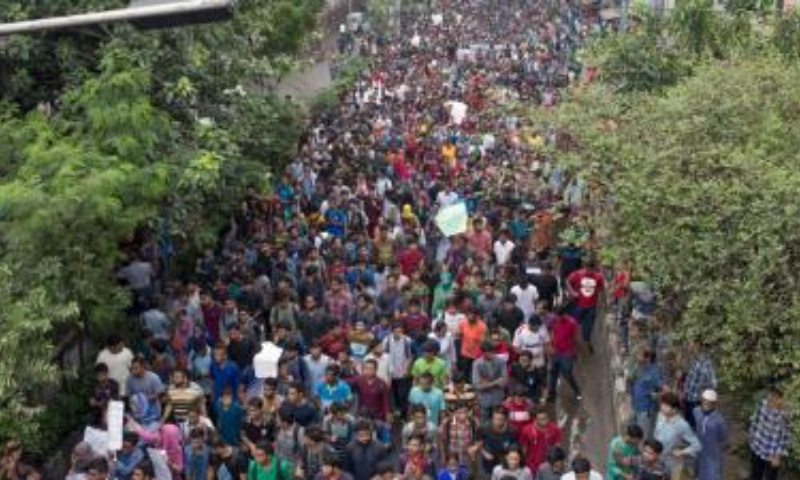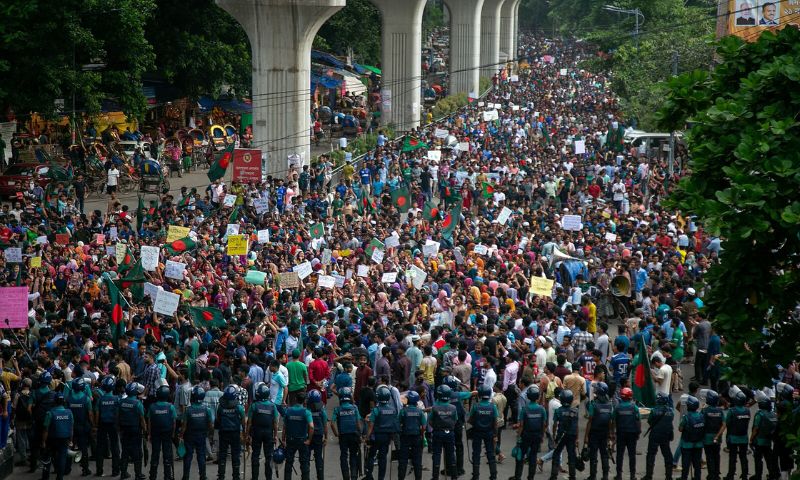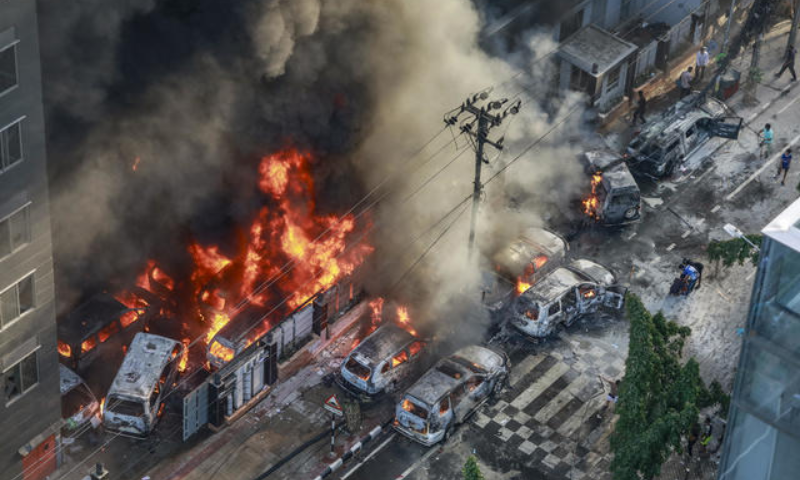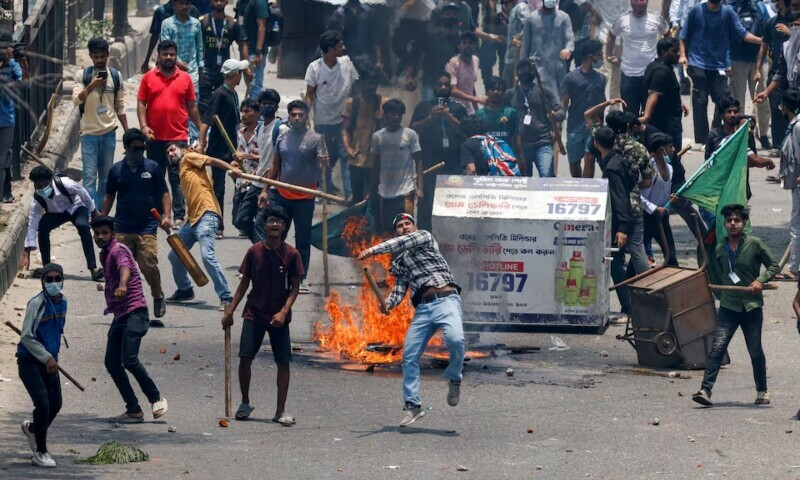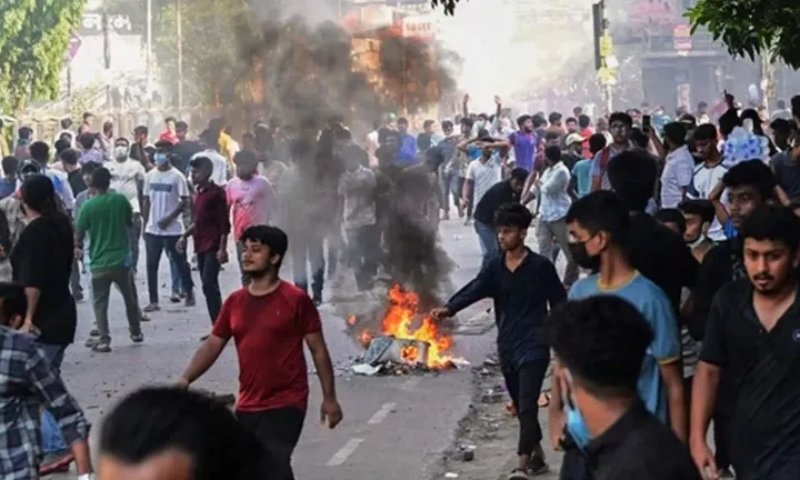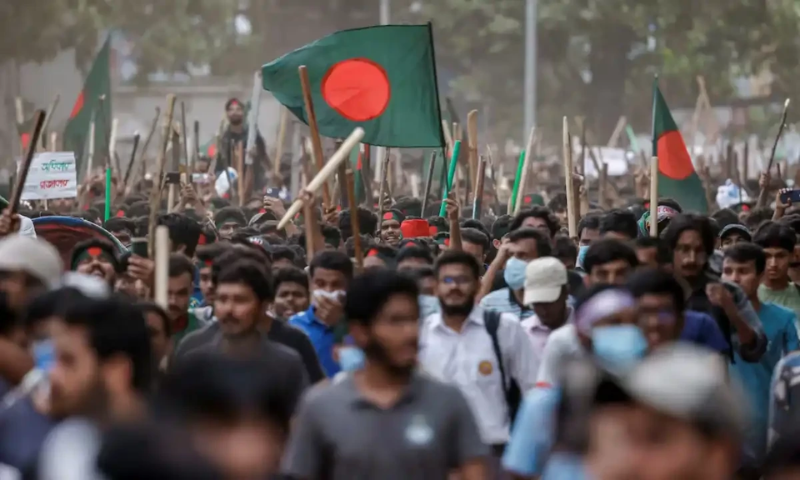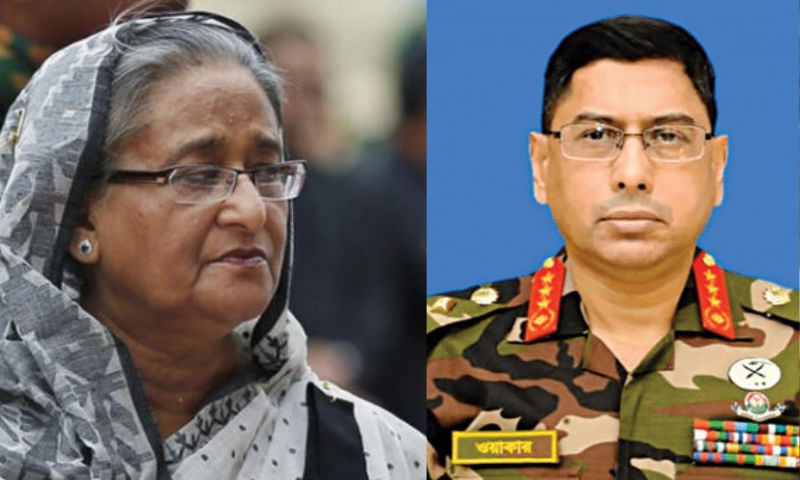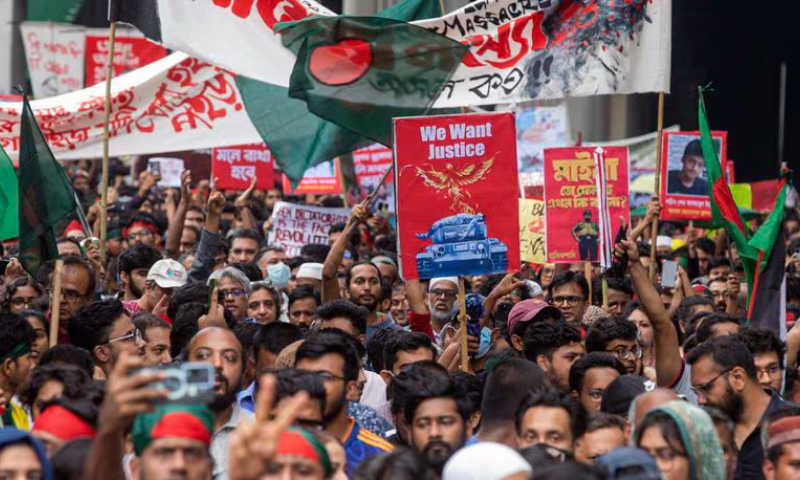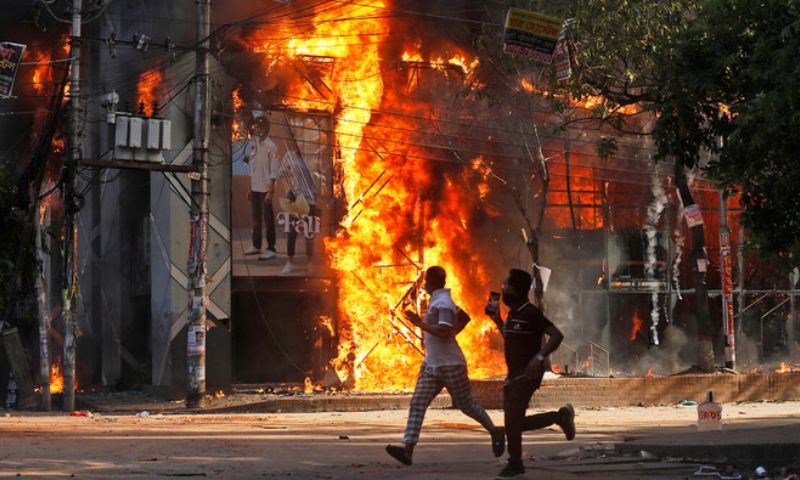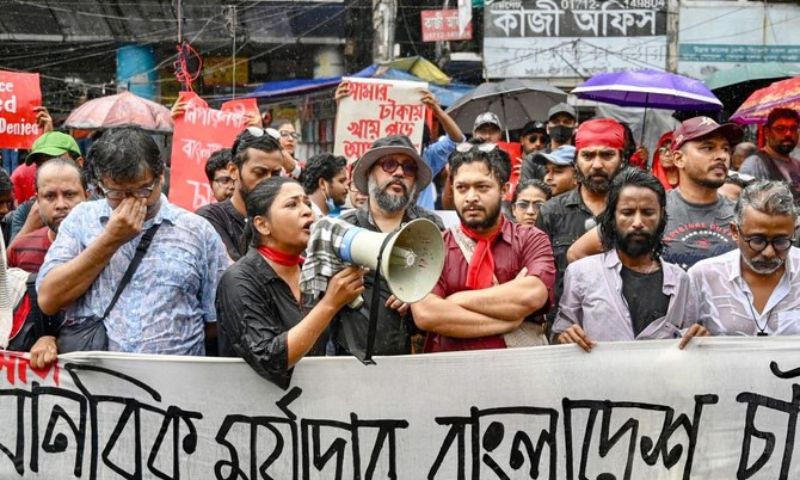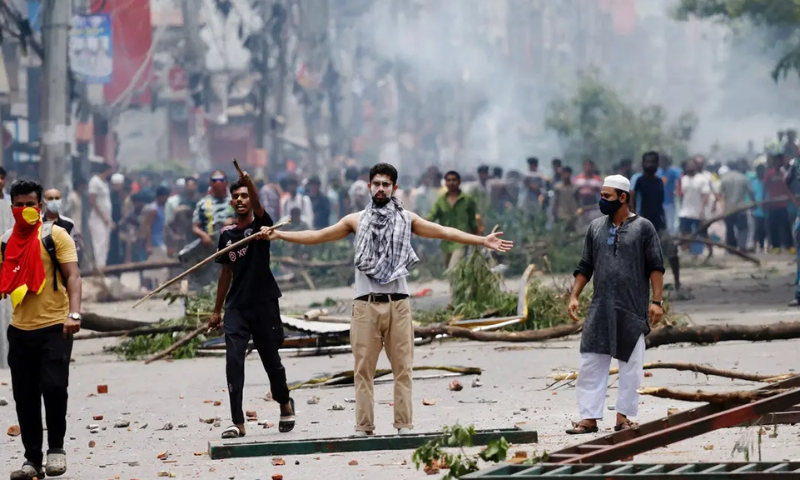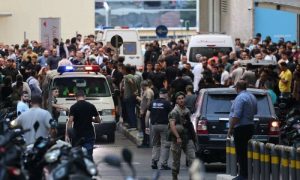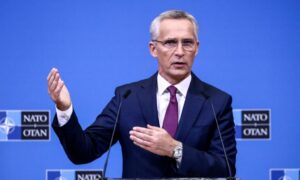DHAKA: Bangladesh’s Army Chief General Waker-uz-Zaman said on Monday he will form an interim government after Prime Minister Sheikh Hasina stepped down and fled Dhaka in the face of mass protests demanding her resignation.
In his address broadcasted on state television, the Army Chief confirmed that Prime Minister Sheikh Hasina has resigned after weeks of political unrest in the country. He said that an interim government would be formed and committed to addressing the nation’s pressing issues.
The army chief vowed to tackle the violence and address the economic and social turmoil that has affected Bangladesh. He expressed a resolve to address “all the injustices”.
“I give you my word that all the injustices will be addressed,” the career infantry officer said, although it was not immediately clear if he would head the new government.
General Waker said he would speak to the president to form a government. He vowed that the new authorities would “prosecute all murders” following weeks of deadly protests.
The army was deployed on the streets to crush the protests last month but shifted on Sunday and in several instances allowed demonstrations to go on.
“All of us together will forge a beautiful future,” he said. “If we work together, we can achieve a favourable outcome”.
“The country has suffered a lot, the economy has been hit, many people have been killed — it is time to stop the violence,” Waker-Uz-Zaman stated. He emphasized the need for peace and stability, urging protesters to cease their actions and support the new military administration.
With a distinguished military career, including service as a UN peacekeeper in Angola and Liberia, Waker-Uz-Zaman has built a reputation for competence and dedication. His father-in-law had previously served as army chief during Hasina’s first term as prime minister from 1996 to 2001.
The recent unrest began as student protests against government hiring policies but escalated into broader demands for Hasina’s resignation. The violence claimed at least 300 lives and prompted the army’s intervention on the streets.
General Waker-Uz-Zaman has pledged to work with opposition parties and civil society to form a new government, but he has yet to engage with Hasina’s Awami League. He urged university students, who were at the forefront of the protests, to remain calm and assist in restoring order.
Aide says the deposed Prime Minister Sheikh Hasina has fled the capital, Dhaka, by helicopter. Thousands of people especially students take to the streets and roads to celebrate, while many people; storm the prime minister’s official residence. Protest demonstrations that started last month over governmental job quotas expanded into nationwide political unrest.
Students have been marching on roads of Dhaka to demand justice for around 300 people killed since last month.
Bangladesh Prime Minister Sheikh Hasina has resigned, a BBC reporter in the South Asian country confirms. The mounting mass protests demanding her resignation, Bangladesh’s Prime Minister Sheikh Hasina has reportedly departed Dhaka.
The protests, which have escalated significantly in recent days, prompted Hasina and her sister to leave the safety of Ganabhaban, the Prime Minister’s official residence, for a more secure location.
It was revealed that Hasina intended to record a speech addressing the situation but was unable to do so due to the chaotic circumstances. This development highlights the intensifying unrest and growing political crisis in Bangladesh, underscoring the challenges facing the Prime Minister as public discontent continues to surge.
Thousands of demonstrators from Bangladesh assaulted Prime Minister Sheikh Hasina’s palace in Dhaka, following her departure from large-scale protests calling for her resignation.
Bangladeshi media aired footage of reveling masses rushing into the premier’s official mansion in the city and waving at the camera.
The death toll from the ongoing clashes in Bangladesh has surged to at least 300, with 94 people losing their lives on Sunday alone, marking the deadliest day in recent weeks of anti-government demonstrations. This figure is based on reports from police, officials, and doctors at hospitals. As protests are set to resume, heavy deployments of soldiers and police are patrolling key roads in the capital Dhaka, barricading routes to Prime Minister Sheikh Hasina’s office.
The unrest began last month over civil service job quotas and has escalated into some of the most severe turmoil of Hasina’s 15-year rule, with protesters now calling for her resignation. The situation has led to widespread disruptions, including restricted mobile internet, closed offices, and the shutdown of the country’s economically vital garment factories.
On Sunday, clashes between hundreds of thousands of protesters and government supporters involved sticks, knives, and security forces using rifles. In Dhaka, soldiers and police used barbed wire to enforce a curfew. “We are calling on students and the public all over the country to march towards Dhaka,” said Asif Mahmud, a key leader in the civil disobedience campaign. “The time has come for the final protest.”
Escalating Violence
Sunday’s violence resulted in 94 deaths, including 14 police officers killed in the northeastern town of Enayetpur when protesters stormed a police station. The total number of fatalities since the protests began in early July has reached at least 300. “The shocking violence in Bangladesh must stop,” urged United Nations rights chief Volker Turk.
Ali Riaz, a politics professor and expert on Bangladesh, expressed deep concern, noting that Hasina is “digging her heels in.” He described the unrest as “an unprecedented popular uprising” and highlighted the unmatched ferocity of state actors and regime loyalists. Videos on social media showed protesters in Dhaka smashing a statue of Sheikh Mujibur Rahman, Hasina’s father and the country’s independence leader, with hammers.
Growing Support
Michael Kugelman, director of the South Asia Institute at the Wilson Center, noted that Hasina is rapidly losing support and legitimacy. “The protests have gained immense momentum, fueled by raw anger and confidence from knowing that much of the nation supports them,” he said.
In a symbolic rebuke, former army chief General Ikbal Karim Bhuiyan demanded the government withdraw troops and allow protests, stating that those responsible for the crisis must be brought to justice. Waker-uz-Zaman, the current army leader, stated that the armed forces “always stood by the people,” although he did not say specifically whether the army supported the protesters.
A Nation United
Stars in the film industry, musicians, and singers are among the Bangladeshi society who have supported the anti-government movement. Hasina, who has ruled Bangladesh since 2009, won her fourth consecutive election in January in a vote criticized for lacking genuine opposition. Her government is accused of misusing state institutions to entrench power and suppress dissent, including through extrajudicial killings of opposition activists.
The protests, which began over a reintroduced quota scheme reserving more than half of all government jobs for certain groups, have persisted despite the scheme being scaled back by Bangladesh’s top court. As the nation braces for further unrest, the call for Hasina’s resignation grows louder, reflecting widespread frustration and anger among the Bangladeshi people.